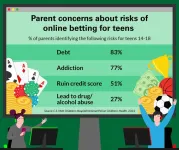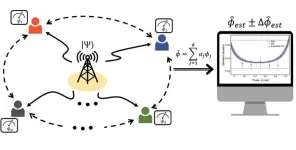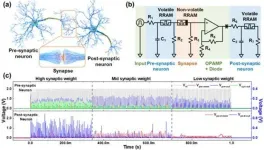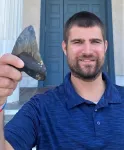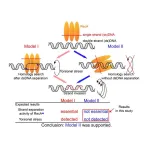(Press-News.org) As young people increasingly have access and exposure to online gambling, only one in four parents say they have talked to their teen about some aspect of virtual betting, a national poll suggests.
But over half of parents aren’t aware of their state’s legal age for online gambling and one in six admit they probably wouldn’t know if their child was betting online, according to the University of Michigan Health C.S. Mott Children’s Hospital National Poll on Children’s Health.
“Teens and young adults may have a difficult time going into a casino unnoticed but they have easy access to a variety of betting and gambling options,” said Mott Poll co-director Sarah Clark, M.P.H.
“This expanded accessibility has increased exposure to the risks of underage betting, but there is little regulation or conversation around this problem.”
Online gambling more accessible than ever
Since a landmark 2018 U.S. Supreme Court ruling, over half of states have legalized some type of online gambling. Although most states restrict online sport and casino betting to 21 years or older, there are loopholes and concerns that adolescents and teens may bypass security measures.
Online sports betting is similar to fantasy football leagues and college basketball tournament pools that are popular with sports fans, including high schoolers and even younger kids, Clark says.
“Many online gambling options will seem familiar to teens,” Clark said. “They feel like games kids have been playing on their phones, including features like bonus points and rewards. That familiarity may make it harder for teens to appreciate the difference between playing for fun and playing for money.”
Yet, just two percent of parents polled believe that their teen has used an online betting platform, while more than half of parents felt they would definitely know if their teen has been betting online.
“Parents may be underestimating their teen’s interest and savviness,” Clark said. “Online betting can be difficult to detect because a teen can easily log in on their smartphone or other personal device, delete the search history, hide the app or use it discretely.”
Additionally, two-thirds of parents reported their teen has a bank account or debit or credit card in their own name that could be used to register for online betting platforms. This makes it even more possible, Clark notes, for teens to participate in online betting without their parents’ knowledge.
Kids commonly exposed to online gambling
A third of parents say that they or another adult in their household participate in online, in-person, or social betting, finds the nationally representative poll that’s based on responses from 923 parents with at least one child ages 14-18.
Another 63% say they have seen or heard ads for online sports or casino betting in the past year. Young people who engage in fantasy sports or gaming apps intended for adults, may also be exposed to gambling advertisements.
Such ads often feature entertainers and sports figures that are popular with teens and young adults, Clark says, along with enticing bonuses, online social casino games and graphics encouraging continued use.
“Teens may be especially susceptible to these ads, which are often marketed to convey feelings of excitement, endless possibilities, and social credit,” Clark said.
Many parents worried about gambling risks
Two-thirds of parents think the legal age for online betting should be 21 years, while 22% say it should be between 18-20 years and 11% feel it shouldn’t be legal at any age.
Many parents also expressed concerns about youth risks, including going into debt or developing a gambling addiction as a result of online betting. And the quarter of parents who have talked with their teen about some aspect of online betting commonly discussed these risks.
Some parents also support certain strategies they see as effective in minimizing the risks of online betting for youth or young adults, such as restricting betting after a certain amount is lost, offering a “parent view” option to monitor online betting accounts, verifying legal age with photo ID to open an online betting account, limiting the amount that can be bet within a certain timeframe and paying treatment costs for youth or young adults who develop gambling addictions.
Clark encourages parents to address the topic with teens to help them understand the strategies used by gambling sites to lure people into betting more frequently and in larger amounts.
“The ubiquity of gambling ads may offer parents an opportunity to initiate open, productive conversations with their teen about the risks of gambling and its prevalence in their social circles,” Clark said.
“Whether or not the child is actually using betting platforms, ongoing discussions may help them navigate the social pressures and media presence of gambling platforms.”
END
Digital dice and youth: 1 in 6 parents say they probably wouldn’t know if teens were betting online
The expansion of online gambling opens up risks of youth access but few parents believe their child has engaged in digital betting, national poll suggests
2024-01-22
ELSE PRESS RELEASES FROM THIS DATE:
Enable distributed quantum sensors for simultaneous measurements in distant places
2024-01-22
We've all had the experience of trying to get the exact time of a highly competitive concert ticket or class beforehand. If the time in Seoul and Busan is off by even a fraction of an hour, one will be less successful than the other. Sharing the exact time between distant locations is becoming increasingly important in all areas of our lives, including finance, telecommunications, security, and other fields that require improved accuracy and precision in sending and receiving data.
The Korea Institute of Science and Technology (KIST) announced that Dr. Hyang-Tag Lim and his team at the Center ...
Implement artificial neural network hardware systems by stacking them like "neuron-synapse-neuron" structural blocks
2024-01-22
With the emergence of new industries such as artificial intelligence, the Internet of Things, and machine learning, the world's leading companies are focusing on developing next-generation artificial intelligence semiconductors that can process vast amounts of data while consuming energy efficiently. Neuromorphic computing, inspired by the human brain, is one of them. As a result, devices that mimic biological neurons and synapses are being developed one after another based on emerging materials and structures, but research on integrating individual devices into a system to verify and optimize them ...
The megalodon was less mega than previously believed
2024-01-22
A new study shows the Megalodon, a gigantic shark that went extinct 3.6 million years ago, was more slender than earlier studies suggested. This finding changes scientists’ understanding of Megalodon behavior, ancient ocean life, and why the sharks went extinct.
The Megalodon or megatooth shark is typically portrayed as a super-sized monster in popular culture, with recent examples in the sci-fi films “The Meg” (2018) and “Meg 2: The Trench” (2023). Previous studies assume that the shark likely reached lengths of at least 50 feet and possibly as much as 65 feet.
However, the Megalodon is largely known only from its teeth and vertebrae in the ...
Slender shark: Study finds Megalodon was not like a gigantic great white shark
2024-01-22
CHICAGO — A new scientific study shows that the prehistoric gigantic shark, Megalodon or megatooth shark, which lived roughly 15-3.6 million years ago nearly worldwide, was a more slender shark than previous studies have suggested.
Formally called Otodus megalodon, it is typically portrayed as a super-sized, monstrous shark in novels and sci-fi films, including “The Meg.” Previous studies suggest the shark likely reached lengths of at least 50 to 65 feet (15 to 20 meters). However, ...
New criteria for sepsis in children based on organ dysfunction
2024-01-21
Clinician-scientists from Ann & Robert H. Lurie Children’s Hospital of Chicago were among a diverse, international group of experts tasked by the Society of Critical Care Medicine (SCCM) with developing and validating new data-based criteria for sepsis in children. Sepsis is a major public heath burden, claiming the lives of over 3.3 million children worldwide every year. The new pediatric sepsis criteria – called the Phoenix criteria – follow the paradigm shift in the recent adult criteria that define sepsis as severe ...
Development and validation of the Phoenix criteria for pediatric sepsis and septic shock
2024-01-21
About The Study: In this international, multicenter, retrospective cohort study including more than 3.6 million pediatric encounters, a novel score, the Phoenix Sepsis Score, was derived and validated to predict mortality in children with suspected or confirmed infection. The new criteria for pediatric sepsis and septic shock based on the score performed better than existing organ dysfunction scores and the International Pediatric Sepsis Consensus Conference criteria.
Authors: Tellen D. Bennett, M.D., M.S., of the University of Colorado School of Medicine and Children’s Hospital Colorado in Aurora, is the corresponding author.
To access the ...
International consensus criteria for pediatric sepsis and septic shock
2024-01-21
About The Study: The Phoenix sepsis criteria for sepsis and septic shock in children were derived and validated by the international Society of Critical Care Medicine Pediatric Sepsis Definition Task Force using a large international database and survey, systematic review and meta-analysis, and modified Delphi consensus approach. A Phoenix Sepsis Score of at least 2 identified potentially life-threatening organ dysfunction in children younger than 18 years with infection, and its use has the potential to improve clinical care, epidemiological assessment, and research in pediatric sepsis and septic shock around the world.
Authors: R. Scott ...
CU researchers unveil modernized criteria for pediatric sepsis and septic shock
2024-01-21
An international research team led by Tell Bennett, MD, MS, professor of biomedical informatics and pediatric critical care at the University of Colorado School of Medicine, released new diagnostic criteria for sepsis in children this week, marking the first update to the pediatric sepsis definition in nearly two decades.
The updated criteria, presented at the 2024 Critical Care Congress of the Society for Critical Care Medicine (SCCM), will be utilized ...
A computerized decision support system significantly reduces high-risk drug combinations in Intensive Care patients
2024-01-21
A recent multicentre study led by Amsterdam UMC and conducted in nine Dutch Intensive Care Units (ICUs) has shown that tailoring a computerised decision support system (CDSS) to the ICU environment significantly reduced the number of high-risk drug combinations administered to ICU patients. It also improved monitoring ICU patients when avoiding such combinations was not possible, and reduced the length of patients’ stay in the ICU. This study is published today in The Lancet.
"Not more, but fewer and more relevant alerts by a CDSS make such a system more valuable for healthcare providers and patients," says Amsterdam ...
Scientists unravel key steps in the road to DNA repair
2024-01-20
Tokyo, Japan – Researchers from Tokyo Metropolitan University have been studying DNA repair by homologous recombination, where the RecA protein repairs breaks in double-stranded DNA by incorporating a dangling single-strand end into intact double strands, and repairing the break based on the undamaged sequence. They discovered that RecA finds where to put the single strand into the double helix without unwinding it by even a single turn. Their findings promise new directions in cancer research.
Homologous recombination (HR) is a ubiquitous biochemical process shared across all living things, including animals, plants, fungi, and bacteria. As we go about our daily ...
LAST 30 PRESS RELEASES:
Yale study challenges notion that aging means decline, finds many older adults improve over time
Korean researchers enable early detection of brain disorders with a single drop of saliva!
Swipe right, but safer
Duke-NUS scientists identify more effective way to detect poultry viruses in live markets
Low-intensity treadmill exercise preconditioning mitigates post-stroke injury in mouse models
How moss helped solve a grave-robbing mystery
How much sleep do teens get? Six-seven hours.
Patients regain weight rapidly after stopping weight loss drugs – but still keep off a quarter of weight lost
GLP-1 diabetes drugs linked to reduced risk of addiction and substance-related death
Councils face industry legal threats for campaigns warning against wood burning stoves
GLP-1 medications get at the heart of addiction: study
Global trauma study highlights shared learning as interest in whole blood resurges
Almost a third of Gen Z men agree a wife should obey her husband
Trapping light on thermal photodetectors shatters speed records
New review highlights the future of tubular solid oxide fuel cells for clean energy systems
Pig farm ammonia pollution may indirectly accelerate climate warming, new study finds
Modified biochar helps compost retain nitrogen and build richer soil organic matter
First gene regulation clinical trials for epilepsy show promising results
Life-changing drug identified for children with rare epilepsy
Husker researchers collaborate to explore fear of spiders
Mayo Clinic researchers discover hidden brain map that may improve epilepsy care
NYCST announces Round 2 Awards for space technology projects
How the Dobbs decision and abortion restrictions changed where medical students apply to residency programs
Microwave frying can help lower oil content for healthier French fries
In MS, wearable sensors may help identify people at risk of worsening disability
Study: Football associated with nearly one in five brain injuries in youth sports
Machine-learning immune-system analysis study may hold clues to personalized medicine
A promising potential therapeutic strategy for Rett syndrome
How time changes impact public sentiment in the U.S.
Analysis of charred food in pot reveals that prehistoric Europeans had surprisingly complex cuisines
[Press-News.org] Digital dice and youth: 1 in 6 parents say they probably wouldn’t know if teens were betting onlineThe expansion of online gambling opens up risks of youth access but few parents believe their child has engaged in digital betting, national poll suggests
